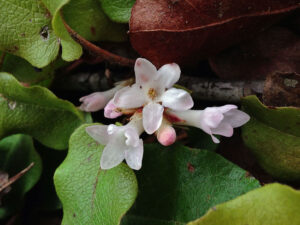When my siblings and I were going through mom’s things after her passing, we came across an old booklet she had kept but which we hadn’t seen in many years. The best way to describe it would be as a hybrid between a diary, a journal, and a scrapbook. On its pages, she had recorded various special occasions as well as some of her feelings and emotions about them. It was moving to read her reflections on her life events.
What made it more like a scrapbook, however, was the inclusion of various items such as a few rose petals, a swatch of fabric, or some newspaper clippings. One such item immediately caught our attention and commanded a silent pause as we stared at each other in disbelief. Lying between two pages were the pressed and dried blossoms of Trailing Arbutus along with a few attached leaves.
The cause for our pause was the story that we had heard mom tell about how these were the very first flowers that dad ever gave her when they first started courting. As we stared at the dried blossoms, we were pretty sure they were THE original ones that dad had given her sixty-four years earlier. We had assumed they had disappeared long ago. 
Mom was pretty sentimental about such things, however, and we didn’t need Carbon 14 dating to tell us they were the actual ones. You could say those flowers helped open her heart to the many more flowers dad gave her over their nearly fifty-nine years together and eventually resulted in us and our families. So what was it about these blossoms that were so powerful?
Most folks are likely unacquainted with this tiny spring wildflower. Unlike the dogwood or bluebell, it is very small and unassuming. Also known as the Mayflower, it grows along the ground in the woods on a small vine and can easily be unknowingly trampled underfoot. In fact, I’m sure I’ve done so many times. Few wildflowers are any smaller, less showy, and so often missed.
What is unique about these little pink or white blooms, however, is their big smell! The sweet delicious fragrance of arbutus can often be detected by the nose long before its beauty is discovered by the eye. In fact, I’ve been turkey hunting before with my attention firmly focused on gobblers and hens and stopped dead in my tracks to start looking for this plant once I realized what I was smelling.
Oh to be an arbutus Christian: one that isn’t showy or obnoxious, not intrusive or overwhelming, but one that silently saturates the atmosphere all around with the sweet odor of Jesus’ love. In 2 Corinthians 2:14-16, Paul says that through us, God “spreads everywhere the fragrance of the knowledge of (Jesus). For we are to God the aroma of Christ among those who are being saved and those who are perishing. To the one we are the smell of death; to the other, the fragrance of life.”
Indeed, the knowledge of Jesus is very sweet and those who know Him have the high privilege of spreading His pleasing scent wherever they go. Unfortunately, there are some to whom this aroma is offensive, but nevertheless, we can’t help smelling the way we do if we have been grafted into Christ’s vine, just as arbutus blossoms can’t help smelling the way God made them to.
What I’ve learned since about arbutus is even more incredible. This unobtrusive plant grows from a particular specie of fungus that nourishes the root, which means that God actually uses this unique plant to turn something dead into something not only alive, but beautiful and highly pleasant, delighting both the eye and the nose!
The sweet pungent smell of arbutus, combined with dad’s love, opened mom’s heart to an eventual marriage of fifty-eight and one half years, four children, ten grandchildren and now fourteen great grandchildren. That smell is powerful indeed! But even more potent is the sweet aroma of Jesus Christ, for if we allow it to draw us to Him, we become a part of His eternal family that spans the globe and transcends the centuries.
As we enjoy the spring wildflowers blooming profusely all about, let us praise their Creator and may they remind us to exude the rich beautiful smell of our Redeemer to all those around us as well.
Enjoying the aromas, George